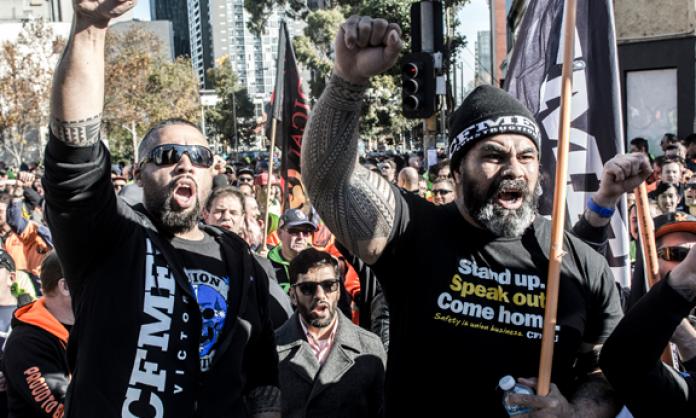The jumble of cranes that dominate Melbourne’s skyline isn't moving today. The colossal building boom that’s transforming the city is stopped in its tracks. The power that our side has is on display for anyone who cares to look, as a river of fluro-clad workers flows out of construction sites and down city streets.
The ABCC, the federal government’s anti-union task force, has sent out its legal threats. Construction bosses around town have read the riot act to workers. But bosses, taskforces and lawyers don’t build buildings. The workers do. And today, for a few hours, nothing is moving.
As we hear from leaders of each of the construction unions, the challenges are clear enough. CFMEU secretary John Setka describes being escorted out of a precast concrete yard last Friday by Victoria Police. Daniel Andrews’ Labor government has awarded contracts for the enormous CBD rail tunnel to a string of notorious anti-union companies that are refusing to even meet with the CFMEU.
We pause for a minute’s silence to remember the workers – 13 so far this year, according to official figures – killed on the nation’s construction sites, and to pay our respects to the victims of the Grenfell Tower fire in London. We hear about the ongoing, outrageous attacks of the ABCC – its legal cases this year have resulted in fines of $1.5 million against the construction unions.
There’s talk about defying the law – and more than talk, given that the whole rally has been declared unprotected industrial action by the ABCC. But the emphasis is very much on “maintaining the rage”, as Australian Workers Union secretary Ben Davis puts it, and voting the Liberals out at the next election. For some of us, who remember how the unions’ campaign in 2007 toppled the Liberal government but failed to win the abolition of the ABCC under Labor, it feels like a bad bit of history repeating.
Earl Setches from the Plumbers Union talks about the charges of blackmail that have been laid against John Setka and CFMEU assistant secretary Shaun Reardon. It’s a drastic step in the criminalisation of unions in this country: officials of an industrial organisation make an industrial threat to get an industrial outcome, and end up on criminal charges that could see them jailed for 15 years.
As Reardon leaves the stage, he pauses at the microphone and makes an obvious, but telling, observation: “They can’t lock us all up”.
And that’s the bottom line. Workers pour all that concrete, operate all those cranes, and keep all that profit flowing. If those workers refuse to play by the government’s rules, not just once or twice to protest in the lead-up to an election, but month after month in a sustained industrial campaign, we could make union-busting an unprofitable, and therefore futile, activity.
The power we saw today is the only language that the bosses, their politicians, their lawyers, and their pet anti-union task forces understand. It’s that strength we have to rely on.












